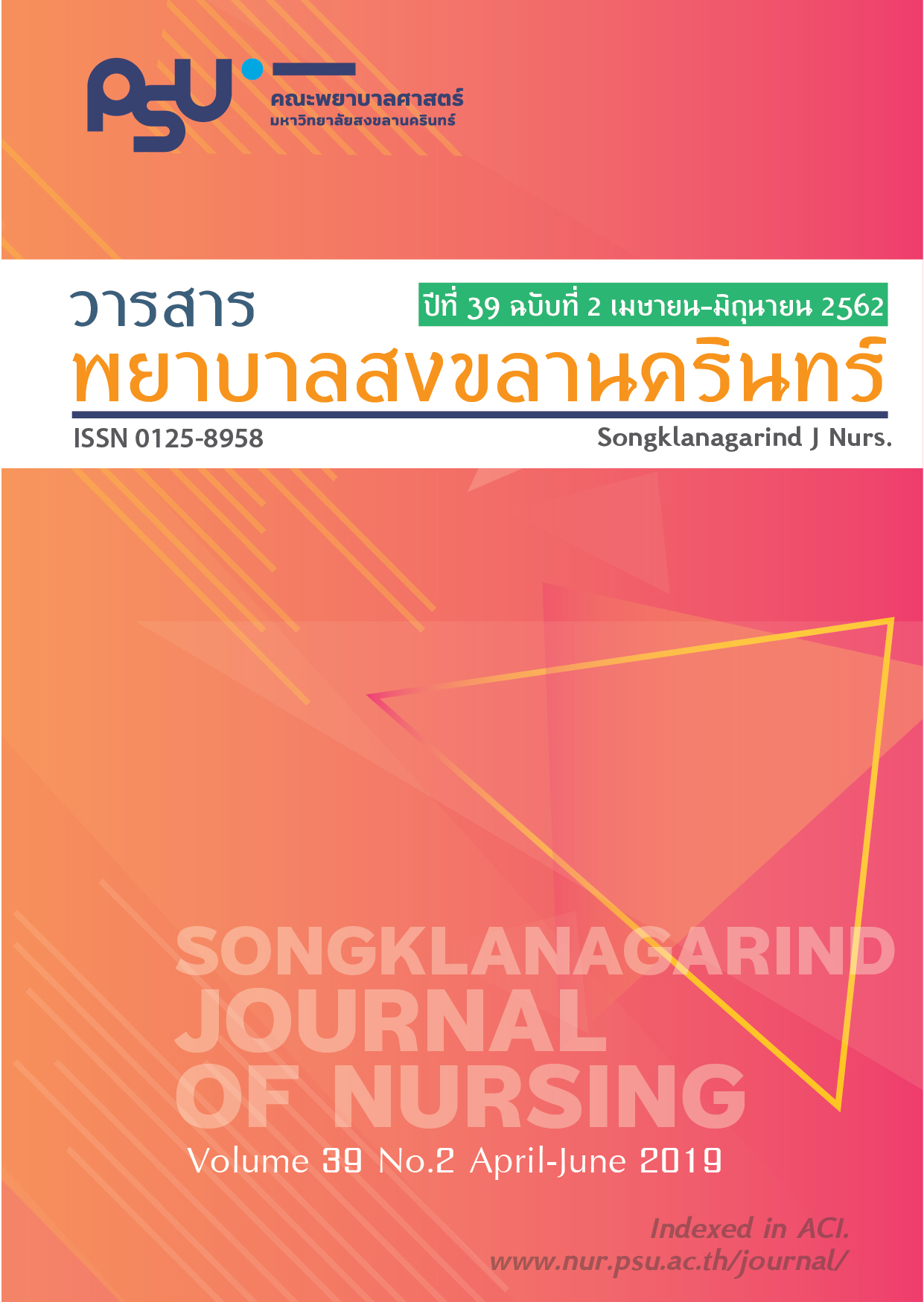Effects of a Self-Help Group and Coping Among Caregiversof Children with Cancer Receiving Chemotherapy
Main Article Content
Abstract
The purpose of this quasi-experimental study was to examine the effects of a self-help group on stressand coping among caregivers of children with cancer receiving chemotherapy. The sample consisted of caregivers of children with cancer admitted in the hospital, Songkhla province. Purposive sampling was used to divide the sample into a control group (n=25) and an experimental group (n=25). Data were collected using the demographic data form, stress questionnaire and coping strategies questionnaires. All questionnaires were tested for content validity by experts. The stress questionnaire was tested for reliability, yielding a Cronbach’s alpha coefficient of .83 and the coping strategies questionnaire was test-retested for reliability, yielding a Pearson’s correlation coefficient .89. Pearson’s correlation coefficient of problem-focused coping, emotional-focused coping and palliative-focused coping were .77, .79 and .70 respectively. Data were analyzed usingdescriptive statistics, chi-square and t-test.
The results revealed that the mean score of stress in the experimental group after participating in theself-help group was significantly lower than that of before participating in a self-help group (p= .001). The mean score of stress in the experimental group after participating in the self-help group was significantly lower than that of the control group (p= .008). The mean score of problem-focused coping in the experimental group after participating in the self-help group was significantly higher than before participating in a self-helpgroup (p= .001). The mean score of the problem-focused coping in the experimental group after participating in the self-help group were significantly higher than that in the control group (p= .048).
Therefore, nurses should apply the self-help group process to decrease the stress and enhance problem-focused coping in these caregivers of children with cancer receiving chemotherapy.
Article Details
References
Seksarn P, Wiangnon S, Veerakul G, Chotsam-pancharoen T, Kanjanapongkul S, Chainansamit S. Outcome of childhood acute lymphoblasticleukemia treated using the Thai National protocols. J Cancer Prev. 2015; 16(11): 4609-14.
Prince of Songkla University Hospital. Department of Hematology. The report of pediatric hematologic patients 2560. Songkla: Hospiatal; 2560. Thai.
Long KA, Marsand AL. Family adjustment to childhood cancer: A systematic review. Clin Child Fam Psychol Rev. 2011; 14: 57-88. doi:10.1007/s10567-010-0082-z.
Marsland AL, Long KA, Howe C, Thompson AL,Tersak JJ, Ewing L. A pilot trial of a stress management intervention for primary caregivers of children newly diagnosed with cancer:Preliminary evidence that perceived social support moderates the psycho social benefit of intervention.J Pediatr Psychol. 2013; 38(4): 449-61. doi: 10.1093/jpepsy/jss173
Alves DF, Guirardello E, Kurashima AY. Stress related to care: The impact of childhood cancer on the lives of parents. Rev Lat Am Enfermagem.2013; 21(1): 356-62. doi: 10.1590/s0104-11692013000100010
Erin MR, Dunn MJ, Zuckerman T, et al. Cancer-related sources of stress for children with cancer and their parents. J Pediatr Psychol.2012; 2(1): 185-97. doi: 10.1093/jpepsy/jsr054
Bonner MJ, Hardy KK, Willard VW, HutchinsonKC. Brief report: Psychosocial functioning o ffathers as primary caregivers of pediatric oncology patients. J Pediatr Psychol. 2007; 32:851-56. doi: 10.1093/jpepsy/jsm011
Goldbeck L. The impact of newly diagnosed chronic pediatric conditions on parental quality of life. Qual Life Res. 2007; 15: 1121-31. doi:10.1007/s11136-006-0068-y
Kim Y, Kashy DA, Spillers RL, et al. Needs assessment of family caregivers of cancer survivors:Three cohorts comparison. Psycho oncology. 2010;19: 573-82. doi: 10.1002/pon.1597.
Meecharoen W. Family caregivers of cancer patients: Roles’ adaptation and quality of life promotion. Rama Nurs J. 2014; 20(1): 10-22.Thai.
Rattanapibun K, Kongsaktrakul C, Patoomwan A.Parent Participation in the care of hospitalixedchildren. Rama Nurs J. 2011; 17(2): 232-47.Thai.
Cohen S, Will TA. Stress, social support and buffering hypothesis. Psychol Bull. 1985; 98(10):310-57.
Lazarus RS, Folkman S. Stress, appraisal and coping. New York: Springer; 1984.
Chansirimongkol B. Stress coping social suppor tand quality of life of family caregivers of person with cancer receiving radiotherapy[thesis]. [Bangkok]: Mahidol university; 2007.Thai.
Aiadsuy N, Wongvatunyu S, Chaiviboontham S.Stress and coping among family caregivers of the patients with brain tumor awaiting for cranial surgery. Rama Nurs J. 2014; 19(3): 349-64.Thai.
Corey MS, Corey G. Group process and practice 4th ed. Pacific Grove, CA: Brooks/Cole; 1992.
Marram GD. The group approach in nursing practice. 2nd ed. St. Louis, MO: C. V. Mos by;1978.
Tungpunkham P. Psychotherapy for the health professions: concept and application. 2nd ed. Chiang Mai: krongchang-printing; 2014. p 56. Thai.
Jalowiec A. Comfirmatory factor analysis of the Jalowiec Coping Scale. In C. F. Waltz & O. L.Strickland, editors, Measurement of nursing outcome:Volume one measurement of client outcomes(pp. 288-308). New York: Springer; 1988.
Kachangechai S, Atsawapat M. Results of counseling in parents with cancer children at the Annual General Meeting 2013. Paper presented at: The nurses’ association of Thailand northeastern division. Nursing excellence: A key to health in AEC era; 2013 Aug 2-3; Ubon Ratchathani,Thailand. Thai.
Kaewluang N. The effect of self-help group on childcare behaviors and maternal stress in thalassemic children’s mothers [thesis]. [Chon Buri]: Burapa university; 2002. Thai.
Soper DS. Effect size (Cohen’s d) calculator for a student t-test [Internet]. 2016 [cited 2015 May 6]. Available from https://www.danielsoper.com/statcalc
Beltrao MR, Vasconcelos MG, Pontes CM,Albuquerque MC. Childhood cancer: Maternalperceptions and strategies for coping withdiagnosis. J Pediatr (Rio J). 2007; 83(6): 562-66.
Boonsit V. Psychosocial support for children with chronic diseases. In: Soonsawang J, Limprayoon K,Ngerncham S, Sanpakit K & Kolatat T, editors.New frontier in pediatrics. Bangkok: House-cando; 2008.


